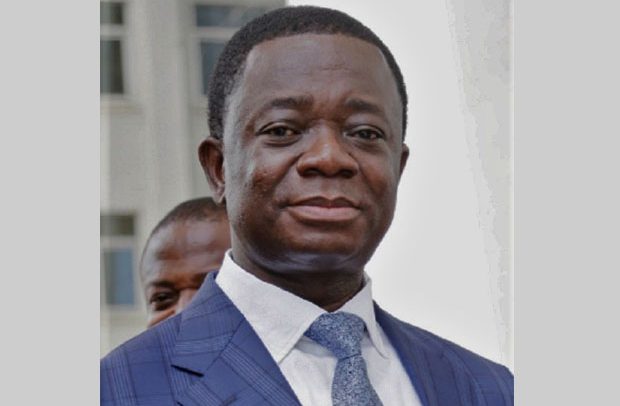Dr. Stephen Opuni
Former Chief Executive Officer of Ghana Cocoa Board, Dr. Stephen Opuni, has failed with another attempt to restrain Justice Clemence Honyenuga, a retired Justice of the Supreme Court from continuing to hear his case for a limited time.
An Accra High Court yesterday dismissed an application filed by his lawyer seeking to restrain the judge from further hearing the case on ground that he has retired after attaining 70 years, which is the statutory retiring age for Supreme Court judges.
Dr. Opuni together with businessman, Seidu Agongo, are on trial for allegedly causing over GH¢217 million financial loss to the state in the supply and purchase of Lithovit liquid fertiliser.
The Chief Justice, in accordance with Article 139(1c) of the Constitution, gave the judge six months pursuant to Article 145 of the Constitution to conclude the trial.
But Dr. Opuni through his counsel filed an application challenging the extension, and his lawyer, Samuel Codjoe, moving the application yesterday argued that the appointment of a High Court judge under Article 144 is totally different from that of the appointment of an additional High Court judge under Article 139(1c).
He said under Article 144(9), it is quite clear that the person to be appointed needs not be an existing judge unlike under 139(1c), which by its provision all Court of Appeal and Supreme Court judges are potentially High Court judges.
“We are submitting that the Chief Justice engaged in an unconstitutional act when he purported to extend the tenure of your Lordship under 144(11),” Mr. Codjoe argued.
He further argued that the power to extend the tenure of a Supreme Court judge is not exercised by the Chief Justice, who is not the appointing authority, indicating that “the only person who can grant an extension to the tenure of your Lordship as contained Article 145(4) is the President and not the Chief Justice.
“Although the CJ is the administrative head of the judiciary, he cannot grant an extension to the tenure of a judge who has attained the mandatory constitutional retirement age,” Mr. Codjoe added.
The application was opposed by the Director of Public Prosecutions, Yvonne Atakora Obuobisa, who argued that the Chief Justice has power under the 1992 Constitution to grant power to a Justice of the Superior Court to sit for a limited period of time.
She referred to Article 145(1) (2a) and (4) of the Constitution, and argued that from Article 145(2a) and 4(a), a Justice of the Supreme Court who attains the age of 70 may continue in office for a period not exceeding six months after attaining that age, to enable that judge do any other thing in relation to proceedings which were commenced before attaining that age.
“There is no ambiguity or confusion as to whether it is the President or the Chief Justice who grants an extension to a judge previously determining a case to continue with that matter for a limited period,” she argued.
“If the drafters of the Constitution intended for the President to give an extension, they would have stated so. It is not there because Article 139 has already provided for the one to give this extension for a limited period of time. The Chief Justice has the power to do so, which he has rightly done and it does not sin against Article 144 and 145(2) of the 1992 Constitution,” Mrs. Obuobisa added.
Justice Honyenuga (rtd) dismissed the application on ground that the Chief Justice is the administrative head of the Judiciary and has the power under the Constitution to grant an extension to a retiring judge.
He said the argument that it is the President who appoints and, therefore, must be the one who extends tenure is non-existent and, therefore, dismissed the application.
The court earlier dismissed a preliminary objection raised by Mr. Codjoe seeking to prohibit the judge from hearing the application on ground that he would be acting as a judge in his own case if he heard the motion.
BY Gibril Abdul Razak


